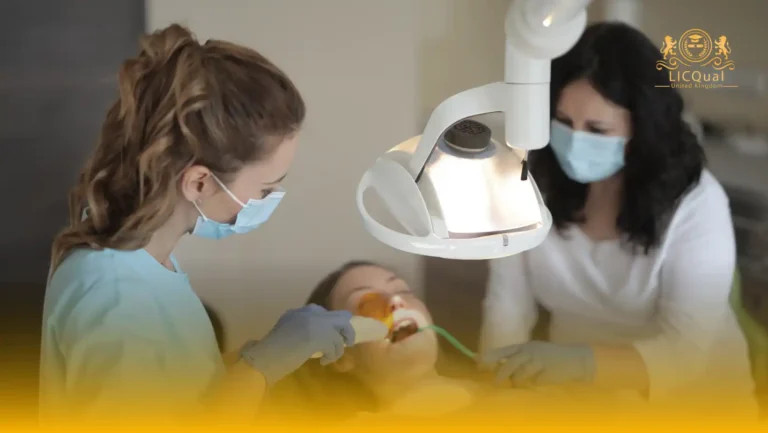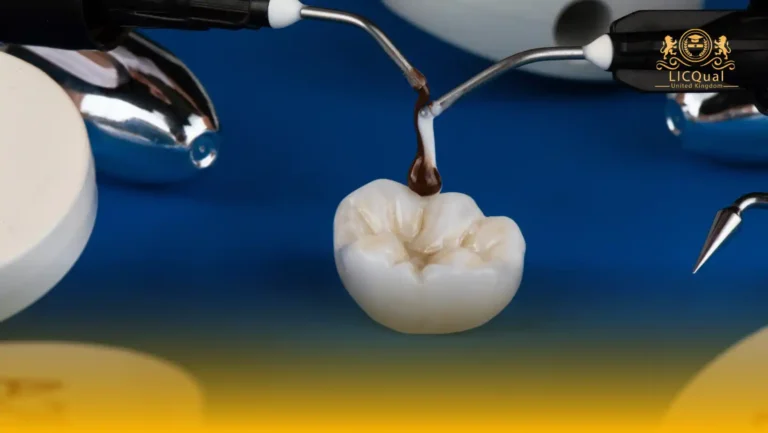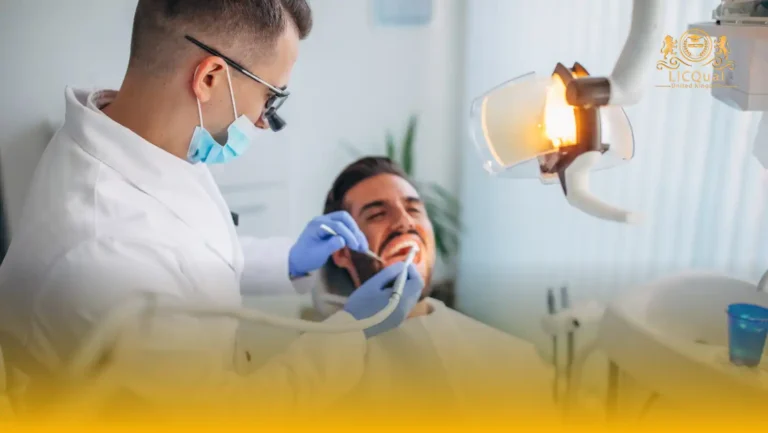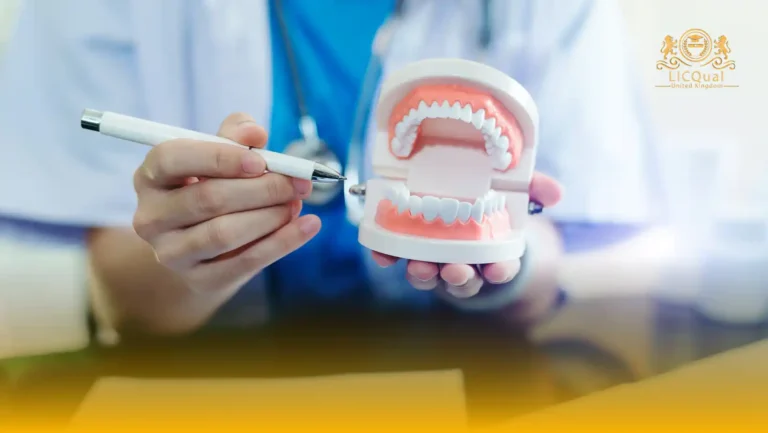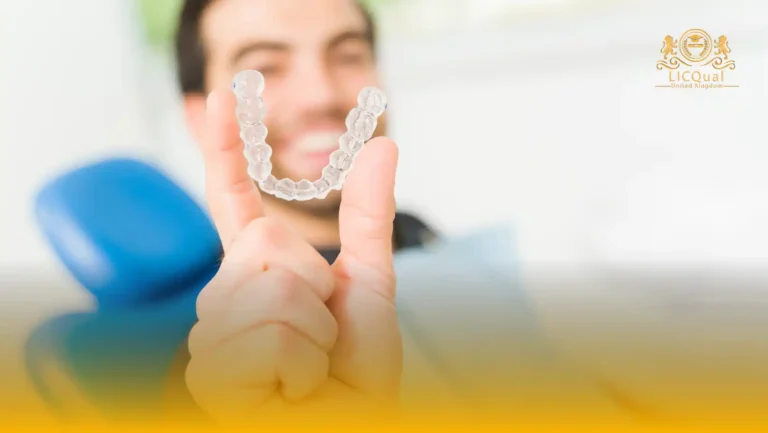The LICQual Level 7 Postgraduate Diploma in Endodontics (PgD Endodontics) is a specialised, advanced-level qualification designed for dental professionals seeking to refine their expertise in the diagnosis, prevention, and treatment of diseases of the dental pulp and surrounding tissues. This programme is meticulously developed to provide learners with an in-depth understanding of contemporary endodontic concepts, advanced clinical techniques, and evidence-based treatment planning.
Unlike entry-level courses, this diploma is not intended for fresh candidates. It is specifically aimed at practising dental professionals who wish to enhance their career prospects, expand their clinical competencies, and elevate the quality of care they provide to patients. The course emphasises both theoretical knowledge and hands-on clinical application, enabling learners to confidently manage complex endodontic cases and adopt the latest advancements in technology and materials.
Throughout the programme, learners will explore advanced root canal treatment procedures, retreatment strategies, management of traumatic dental injuries, and microsurgical endodontics. The qualification also focuses on improving decision-making skills, enhancing treatment outcomes, and ensuring high standards of patient care.
Completion of this diploma contributes significantly to a learner’s Continuing Professional Development (CPD), ensuring they remain at the forefront of modern endodontic practice. With its strong clinical orientation, this qualification empowers dental professionals to deliver precise, predictable, and patient-focused treatment, positioning them as trusted experts in their field.
Course Overview
Qualification Title
LICQual Level 7 Postgraduate Diploma in Prosthodontics (PgD Prosthodontics)
Total Units
6
Total Credits
120
GLH
600
Qualification #
LICQ2200692
Qualification Specification
To enroll in the LICQual Level 7 Postgraduate Diploma in Prosthodontics (PgD Prosthodontics), applicants must meet the following criteria:
|
Qualification# |
Unit Title |
Credits |
GLH |
|---|---|---|---|
|
LICQ2200692-1 |
Fundamentals of Endodontic Science and Pulp Biology |
20 |
100 |
|
LICQ2200692-2 |
Diagnosis, Case Assessment, and Treatment Planning in Endodontics |
20 |
100 |
|
LICQ2200692-3 |
Advanced Endodontic Instrumentation and Irrigation Techniques |
20 |
100 |
|
LICQ2200692-4 |
Root Canal Obturation, Retreatment, and Surgical Endodontics |
20 |
100 |
|
LICQ2200692-5 |
Endodontic Complications, Failures, and Their Management |
20 |
100 |
|
LICQ2200692-6 |
Research Methods, Evidence-Based Practice, and Clinical Case Presentation |
20 |
100 |
By the end of this course, learners will be able to:
1. Fundamentals of Endodontic Science and Pulp Biology
- Critically analyse the structure, function, and pathology of dental pulp and periapical tissues.
- Evaluate biological processes related to pulp inflammation, regeneration, and repair.
- Demonstrate an advanced understanding of the microbiology relevant to endodontic infections.
- Apply principles of pulp biology to clinical decision-making in endodontic practice.
2. Diagnosis, Case Assessment, and Treatment Planning in Endodontics
- Accurately identify endodontic conditions using clinical examination, radiographic interpretation, and advanced diagnostic tools.
- Differentiate between reversible and irreversible pulp pathologies.
- Develop comprehensive treatment plans based on clinical evidence and patient needs.
- Assess patient-specific risk factors and predict prognosis.
3. Advanced Endodontic Instrumentation and Irrigation Techniques
- Select and use contemporary rotary and reciprocating endodontic instruments effectively.
- Apply advanced irrigation protocols to ensure optimal disinfection of the root canal system.
- Evaluate the impact of instrumentation and irrigation on long-term treatment success.
- Implement aseptic techniques and minimise procedural errors.
4. Root Canal Obturation, Retreatment, and Surgical Endodontics
- Perform precise root canal obturation using modern materials and methods.
- Develop strategies for managing complex retreatment cases.
- Demonstrate competency in surgical endodontic procedures such as apicoectomy and root-end filling.
- Critically assess outcomes and identify factors influencing long-term success.
5. Endodontic Complications, Failures, and Their Management
- Identify common and rare complications in endodontic procedures.
- Apply evidence-based strategies for the prevention and management of iatrogenic errors.
- Diagnose and address causes of treatment failure.
- Incorporate advanced troubleshooting techniques into practice.
6. Research Methods, Evidence-Based Practice, and Clinical Case Presentation
- Demonstrate advanced skills in research design, data analysis, and interpretation.
- Critically appraise scientific literature to support clinical decisions.
- Apply evidence-based principles to improve endodontic practice outcomes.
- Present complex clinical cases effectively to professional audiences.
he LICQual Level 7 Postgraduate Diploma in Endodontics (PgD Endodontics) is specifically designed for experienced dental professionals who wish to advance their expertise in the diagnosis, treatment, and management of complex endodontic cases. It is not intended for fresh candidates, but for qualified practitioners seeking to enhance their clinical skills, broaden their knowledge, and strengthen their professional profile within the field of endodontics.
This course is ideal for:
- Qualified Dentists aiming to specialise in advanced endodontic procedures.
- General Dental Practitioners (GDPs) who wish to expand their scope of practice and offer specialist-level root canal treatments.
- Dental Specialists in restorative dentistry or prosthodontics seeking to integrate advanced endodontic techniques into their practice.
- Clinical Educators and Dental Academics who wish to deepen their theoretical and practical understanding of endodontics for teaching purposes.
- Dental Practitioners committed to ongoing Continuing Professional Development (CPD) to maintain the highest standards of patient care.
By completing this qualification, learners will not only gain advanced clinical competence but also increase their career prospects, improve treatment outcomes for patients, and position themselves as highly skilled professionals in the competitive dental industry.
To deliver the LICQual Level 7 Postgraduate Diploma in Endodontics (PgD Endodontics) effectively, approved centres must meet the following requirements to ensure the highest quality of learning and assessment:
- Accreditation & Compliance
- Must be an officially approved and accredited LICQual training centre.
- Ensure adherence to all LICQual quality assurance policies, procedures, and assessment guidelines.
- Qualified Academic Staff
- Employ trainers and assessors with recognised dental qualifications at or above the level of the course.
- Instructors must have substantial clinical experience in endodontics and hold relevant teaching or assessor qualifications.
- Facilities & Resources
- Provide fully equipped dental clinical facilities with modern endodontic instruments, rotary systems, digital imaging equipment, and magnification tools.
- Access to sterilisation and infection control equipment compliant with industry standards.
- Suitable lecture rooms with multimedia facilities for theoretical sessions.
- Learning Materials & Support
- Supply up-to-date course manuals, reference materials, and access to relevant dental journals or online learning platforms.
- Provide learner support services, including academic guidance and mentoring.
- Health & Safety Compliance
- Maintain a safe and hygienic learning environment in line with local and international dental health and safety regulations.
- Ensure all clinical training areas follow proper infection prevention and control protocols.
- Assessment & Record-Keeping
- Implement fair, valid, and reliable assessment methods that align with LICQual requirements.
- Maintain accurate learner progress, assessment, and certification records for auditing purposes.
- CPD Integration
- Encourage and facilitate learners’ Continuing Professional Development (CPD) through supplementary workshops, seminars, or case discussions.
Assessment and Verification
All units within this qualification are subject to internal assessment by the approved centre and external verification by LICQual. The qualification follows a criterion-referenced assessment approach, ensuring that learners meet all specified learning outcomes.
To achieve a ‘Pass’ in any unit, learners must provide valid, sufficient, and authentic evidence demonstrating their attainment of all learning outcomes and compliance with the prescribed assessment criteria. The Assessor is responsible for evaluating the evidence and determining whether the learner has successfully met the required standards.
Assessors must maintain a clear and comprehensive audit trail, documenting the basis for their assessment decisions to ensure transparency, consistency, and compliance with quality assurance requirements.


